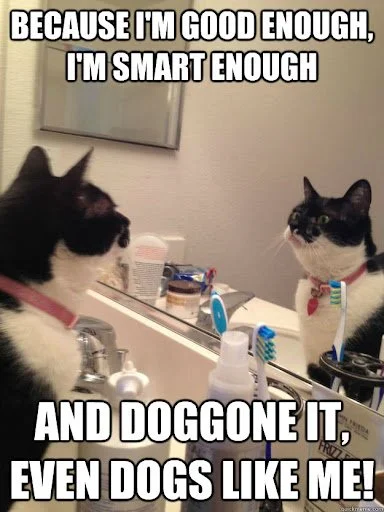68. Avoid toxic positivity
You’ve probably gotten—or given—the advice to “think positively” or “look on the bright side” … but that can backfire in a big way.
Data point of the week
Research reveals a counterintuitive truth: suppressing negative emotions makes them stronger. One study of individuals with an anxiety or mood disorder asked participants to either accept or suppress their feelings while watching an emotional film. The researchers found that the suppression group had increased heart rates, more negative feelings, poorer social adjustment, and decreased well-being after the film.
Other studies looked at the impact of positive self-statements, or affirmations. Affirmations are used to boost mood and improve confidence, but do they work?
It turns out affirmations have the most impact on participants with the lowest self-esteem … in that affirmations make them feel worse.
The researchers concluded that when positive affirmations contradict how people see themselves, they’ll reject the statement or hold on to their original view of themselves even more strongly.
Reflection
How often have you told yourself, “I shouldn’t feel this way” or “I should be grateful”? I’m guilty of this. 🙋♀️ After all, I have so much to be grateful for, and other people face far greater challenges. Yet trying to talk myself out of my feeling rarely works.
As Carl Jung said, “What you resist, persists.”
We don’t just put a positive spin on our own emotions though—we do the same thing to each other, often with negative consequences.
Have you ever shared something hard with a friend, and they responded with reassurance, advice, or encouragement? It happens all the time. And it comes from good intentions: they want us to feel better.
Sometimes it is helpful when a friend shares their belief in us or offers an outside perspective.
But often—when that hard thing we just shared is skipped over—it leaves us feeling invalidated and unheard, teaching us that there’s no room for negative emotions in the relationship. Always looking on the bright side can minimize very real struggles.
Hope, optimism, and gratitude are powerful practices for improving mood … but not when they’re used to deny or suppress difficult feelings.
It’s possible to acknowledge we’re going through a hard time AND feel grateful at the same time.
Image credit: Freepik
Connection Skill & Action Step: Avoid toxic positivity. Let people feel what they’re feeling (this includes you).
Instead of trying to convince yourself—and other people—to feel better, practice creating space for difficult, uncomfortable emotions.
The next time someone shares something hard they’re going through, notice if you feel the urge to cheer them up or say something positive. Pause, and offer empathy instead.
The next time you’re having a hard time, notice if you judge your feelings, tell yourself you’re lucky, or try to convince yourself to “get over it.” Pause, and practice self-compassion instead.
Question of the week: Please share your responses in the comments—I love hearing from you!
Have you ever felt worse from someone trying to cheer you up?
How do you wish they’d responded instead?



